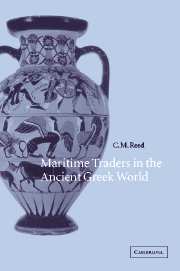Book contents
- Frontmatter
- Contents
- Acknowledgments
- List of abbreviations
- List of references to Greek terms
- Maps
- Introduction
- Chapter 1 Coming to terms
- Chapter 2 Classical modes and patterns of exchange
- Chapter 3 The juridical place of maritime traders
- Chapter 4 The level of wealth of maritime traders
- Chapter 5 Official attitudes towards maritime traders
- Chapter 6 Unofficial attitudes toward maritime traders
- Chapter 7 Archaic modes of exchange and the personnel involved c. 800–475 b.c.
- Chapter 8 Conclusion: then and now
- Appendix 1 Emporoi and nauklēroi: their attested states of origin
- Appendix 2 Cohesion among maritime traders
- Appendix 3 The dikai emporikai
- Appendix 4 Catalogue of emporoi and nauklēroi
- Bibliography
- Index locorum
- General index
Chapter 5 - Official attitudes towards maritime traders
Published online by Cambridge University Press: 22 September 2009
- Frontmatter
- Contents
- Acknowledgments
- List of abbreviations
- List of references to Greek terms
- Maps
- Introduction
- Chapter 1 Coming to terms
- Chapter 2 Classical modes and patterns of exchange
- Chapter 3 The juridical place of maritime traders
- Chapter 4 The level of wealth of maritime traders
- Chapter 5 Official attitudes towards maritime traders
- Chapter 6 Unofficial attitudes toward maritime traders
- Chapter 7 Archaic modes of exchange and the personnel involved c. 800–475 b.c.
- Chapter 8 Conclusion: then and now
- Appendix 1 Emporoi and nauklēroi: their attested states of origin
- Appendix 2 Cohesion among maritime traders
- Appendix 3 The dikai emporikai
- Appendix 4 Catalogue of emporoi and nauklēroi
- Bibliography
- Index locorum
- General index
Summary
INTRODUCTION
What was the official attitude – legislative, administrative, and political – of classical Greek poleis to those trading with them? Athens' response of necessity occupies center stage because most of our evidence comes from there. The surviving bits of evidence from elsewhere show that other poleis also depended upon imports of vital goods, and like Athens these other poleis did what they could to attract and control maritime traders. I first examine Athens' efforts and in the penultimate section turn to the efforts of other poleis, by concentrating on the fourth century and adding references to the fifth where appropriate. I also deal almost exclusively with Athens' grain trade because we know something about those engaging in it, whereas we glimpse only a single emporos or nauklēros (no. 27) engaging in the vital timber trade with Athens, and even there the circumstances are not typical.
In each prytany the Athenian assembly held a plenary session devoted (among other things) to the grain supply; any aspiring politician furthermore was expected to know enough about it to render expert advice. Such an intense concern follows from Athens' unparalleled dependence on grain (described at 16–19 above), which in turn meant an unparalleled dependence on those bringing it – the emporoi and nauklēroi previously described as “professional” (Chapter 1), foreign (Chapter 3), and (in the case of emporoi as least) relatively poor (Chapter 4).
- Type
- Chapter
- Information
- Maritime Traders in the Ancient Greek World , pp. 43 - 53Publisher: Cambridge University PressPrint publication year: 2003



